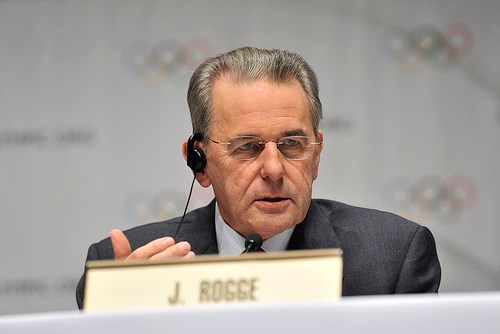IOC’s President Rogge takes controversial questions from the press at closing of IOC Session

Jacques Rogge - closing of the 121st IOC Session in Copenhagen - Final Press Conference (c)IOC/R. Juilliart
09.10.2009
By Ida Relsted KærupCopenhagen, Friday October 9, 2009. IOC President Jacques Rogge took questions from the press at the closing of the IOC Session in Copenhagen.
Questions focused on areas of controversy as the international press sought answers after nine days of IOC Congress and Session. Rogge himself underlined the hard work done and still to come on issues of anti-doping and match fixing.
When asked about the ISL affair, a court case in Zug, Switzerland where high level sports officials were proven to be involved in a bribery case, Mr. Rogge said that the IOC was not in fault and that no IOC member was connected to the ISL case. Instead, he said, “it is mainly a matter between the ISL and FIFA.”
The lead part of the ISL affair, Mr. Weber of the now defunct ISL company, took part both at the IOC Session and lived at the official hotel for the IOC events in Copenhagen, The Marriott. Confronted with this claim by investigative journalist Andrew Jennings, Rogge reported to have been unaware of Weber’s presence until the day before and promised that: “We will have to look into this.”
To the question of whether or not world leaders should be granted presence at the IOC Session to canvas for their national bid to host the Olympics, Rogge suggested that the IOC is going to reassess the attendance of world leaders. One suggestion is that no official higher than the level of Sports Minister can be present, although this may cause some difficulties in the few cases where the heads of state also function as sports minister. Implicitly, the question aimed at US President Barack Obama, whose presence during Chicago’s bid on Friday October 2nd stirred quite a bit of interest.
Another area of examination, in the lime light of the international press, was the election of Danish Crown Prince Frederik and his possible lack of political independence due to national laws, to which Rogge said: “This is in fact very simple, because if he experiences a conflict of interest, he will simply abstain (from voting, ed.).”
Commenting on the current negotiations with USOC, the American national Olympic Committee, Rogge talked of revenue sharing and TV rights. These negotiations might not be easy, he said as he characterized the Americans as “very good business men.”





